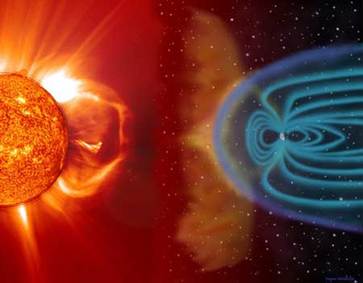在去年上映的《先知》和《2012》两部有关世界末日的影片中,地球最终都是被太阳毁灭的。那么,太阳辐射或者大爆发真的能毁灭地球吗?来看看天文学家的观点吧。
Why the sun didn't destroy earth: Astronomers' new theory
When astronomers began spotting planets around distant stars in the mid-1990s, they were baffled. Many of these early discoveries involved worlds as big as Jupiter or even bigger - but they orbited their stars so tightly that their "years" were just days long. Nobody could imagine how a Jupiter or anything like it could form in such a hostile location, where the radiation of the parent star would have pushed the light gas - which makes up most of such a planet's mass - out to the farthest reaches of the solar system before it could ever coalesce.
But a handful of theorists already had a better explanation at hand. The giant planets could have formed in a much more sensible location, like Jupiter did, and then migrated inward, establishing a stable orbit there. It all made sense, except for one tiny problem: this same model also suggested that a little world like Earth shouldn't exist at all; it (or more precisely, the moon-size proto-planets that eventually assembled into Earth) should have spiraled into the sun more than 4 billion years ago. A star might not gobble a Jupiter whole when it moves close enough, but it could surely swallow a canapÉ like proto-Earth.

"It's a problem," admits Mordecai-Mark Mac Low, an astronomer at New York's American Museum of Natural History. Or, rather, it was a problem - but Mac Low and his collaborators may have solved it. In a paper recently submitted to the Astrophysical Journal, they say that the old, Earth-destroying theory was generally accurate but lacked some key details - ones that both reshape theories about how planets form and, oh yes, allow the planet we know best to exist.
Here's the basic difference: when the planets in our solar system first formed, they were swimming through a disk-shaped cloud of gas. Their passage roiled and compressed the gas, and the gravity of the compressed gas in turn pulled on the proto-planets. The original models suggested that the net effect would have been to drag the proto-planets inward - and while the drag would have stopped as the gas eventually dissipated, it would have been too late. They would long since have fallen into the sun.
But those early models didn't take into account the fact that compressed gas heats up, which limits how dense it can become, and in turn limits how hard its gravity can pull on the proto-planets. Beyond that, the planets' own gravity would fling gas around - the same sort of phenomenon NASA counts on, say, when a spacecraft en route to Saturn gets a slingshot velocity boost from Jupiter on the way. By adding in both effects, Mac Low's collaborator Sijme-Jan Paardekooper, now at Cambridge, found that there are places where the net force pushes a planet inward, but other places where it pushes outward. And in between those are places where the net force is pretty much zero. "Once planets move into these regions," he says, "they stay." And that includes small planets like ours.
Eventually, the disk of gas dissipates, and the proto-planets are fixed in their permanent orbits. Exactly where those orbits lie depends on all sorts of factors peculiar to a given planetary system - how much material there is in the original proto-planetary disk, how much of that is dust and how much is gas, how big the dust grains are, how hot the star is and more. That's one reason we should expect each solar system to look a little bit different. Which, as it turns out, they do.
The new theory is one that has deep appeal to planet geeks but perhaps not as much to folks who don't ordinarily contemplate these things. But consider this: if the theory weren't right, it's possible that none of us would be here to contemplate anything at all.
考考你
1.基督徒说是审判日,但是玛雅人很早就预言了。
2.这种事你一定要保密。
3.总会有人泄露出来。
4.他就是我的忠实听众之一。
《2012》精讲之二参考答案
1.You usually go digging with machine guns?
2.The very same.
3.Do you think those people would behave so selflessly knowing that their own lives were at stake?
4.Mayor, could you escort these good people to the camp grounds, please.
点击查看更多精彩电影回顾
(中国日报网英语点津 编辑:Julie)